- Home
- Aaron Allston
Terminator 3--Terminator Hunt Page 26
Terminator 3--Terminator Hunt Read online
Page 26
“It’s all right,” Ten said. “Do you feel anything? Anything strange?”
Paul shook his head. “Not so far.”
“Let us know the instant you do.”
Ten turned and nodded toward the reception desk. “Odds that it’s under camera surveillance?”
“Unknown,” Mark said. “And that’d be devilishly hard to find out. Cameras could be positioned anywhere on ten floors’ worth of stuff, all pointing down here.”
Paul’s knees suddenly felt weak. His vision blurred. “Now I do feel weird,” he said and sat down again, this time deliberately. He cradled his head in his hands.
“At this time,” Glitch said, “it would be very useful to be certain that you are still yourself.”
“I’m me.”
“Perhaps more evidence would be in order. Where and when are you?”
“Bryce Hotel, October third, twenty twenty-nine.” Paul was now getting a handle on the dizziness. It was fading, but some sensation associated with it was remaining constant.
“That is good. Please continue.”
Paul looked up. Glitch had his Uzi aimed directly at him. “If you think it through, Glitch, it would seem obvious that the time to assume that I’d been regressed by contact with Skynet computers would be when I first started showing confusion about my surroundings. Yes?”
“Perhaps,” the Terminator said. “My instructions on this point call for me to act if, in my discretion, you are a danger or liability to the group. The criteria for establishing that you are a danger are nebulous, however.”
Sato, at the rear of the group, hissed for attention. The others turned to look at him, then at what he was looking at.
The bank of lights above one of the elevators was flickering. As they watched, the light flickered over from G to CL, which was the left-most light. Going in the other direction from G, next would be L, then 2, then 3 through 10.
The light stayed on CL.
“G stands for ‘ground,’ right?” Jenna asked. “Then what is CL?”
Paul shook his head and rose once more. “This lobby is on the ground floor. So G has to be ‘garage.’ I’m not sure about CL.” He thought about it. “I think what just happened is that I interfaced with Eliza. She just came back from somewhere and rode the elevator from the underground garage to a lower level.”
“Does she know you’re here?” Jenna asked.
Paul shrugged. “Unknown. But I think that if she did know it, she’d probably be talking to me.”
Ten said, “We need to go down.”
Mark said, “But we may need what’s in the computer. And a terminal is probably here.”
Ten sighed. “All right. Mark, you and Jenna take that duty, and keep your damned heads down. Mark, give your T-taser to Paul.”
Mark handed the bulky weapon over. “You designed it, I guess it’s only right that you get to fire it.”
“Thank you, tall Hispanic man. You comfort me with your simple words of faith.”
Mark rolled his eyes and turned back toward the lobby.
* * *
They descended, as quietly as possible, two more flights of stairs. Here the stairwell ended in the same sort of door as they’d found in upper levels.
Ten said, “Paul?”
“Uh, Ten, I’m not a security guy.”
“You and Glitch are as close as we have, and he’s optimized more toward sabotaging machines or making them work through brute-force techniques. Just do it.”
Paul set the T-taser and backpack down, then dug his tool kit out of his pack. He cursed himself for not paying more attention to what Mark had been doing. First, the man had run his little mirror all around the door, then had played around with a voltage meter, concentrating on doorknob and hinges, and then had fiddled with a wire at the point along the door frame where the bolt would go, running the wire up to the ceiling and over the door—
That was it. The simple sensor had to be something that measured electrical current flowing between the retractable bolt in the knob apparatus and the metal-rimmed slot in the door frame it went into. Opening the door would interrupt the current, alerting security computers monitoring the building. Mark had attached a wire to the metal rim, then affixed it to the bolt. Then he could pull the door open, and so long as no one pulled the wire free at either end, the electrical current would flow normally.
Paul set about re-creating Mark’s bypass. It took him several minutes, six or eight times as long as Mark had taken, and sweat began running down his back and sides long before he was done.
And when he had finished using a thin, precisely cut strip of gummy black tape to attach the second end of the wire to the bolt, he heard a voice.
Sir, we should be in to Denver in about thirty minutes.
It was Eliza’s voice.
He was pleased that he managed not to drop anything or jerk away and wreck his work. “Ready to go,” he said, his voice low. “And, by the way, I’m hearing the T-X talking.”
Ten whispered, “To you?”
“No. To someone else.”
Well, I’m not sure. That’s sort of against regulations.
“Okay, go.”
Paul pulled the door open and hazarded a quick look. He saw dark wood paneling and somewhat faded carpet. He pulled it farther open and put his head through.
It was a hotel corridor, but broader than the one by which they’d first entered on the upper floor. A plastic sign, its surface simulating wood grain, read:
Anasazi Room
Brown Room
Evans Room
Pike Room
Beside each room name was an arrow pointing right.
“CL,” Paul said. “I’m betting it means ‘conference level.’ These are all conference rooms.” He stood, flipping the length of the wire up over the top of the door as Mark had done.
“Earl, your lead,” Ten said.
Earl took point, a rocket-propelled grenade in hand. Paul gathered up his gear and followed.
Well, actually, that sounds nice. My name is Eliza.
A lot of people tell me that. It’s just a name that runs in my family.
* * *
Hunkered down behind the reception desk, Mark carefully hoisted a live monitor and keyboard down to the floor, then set about cabling the associated computer to his own laptop. “Score one for Keeley,” he said. “This is a reservation database, but I’m betting it’s a cover screen. Once I figure my way past it, I’ll bet I can get into the operational data for this site.”
Jenna, crouched beside him, said, “Give me that mirror on a stick you were using.”
“You know how to use it?”
“It’s a mirror on a stick. Does it need an instruction manual?”
“You offend me.” Mark handed the object over. “I took my bachelor’s degree in mirror on a stick. By the way, it’s called a tactical mirror.”
She held it up to peer over the countertop and turned it slowly from side to side. “You don’t have a bachelor’s degree. You’re too young.”
“It was prenatal.”
“You’re just weird.”
“Ah, bingo. Security Camera City. Let’s flip through and see if we’re on camera like last time.”
* * *
Eliza said: Transition.
Paul felt his mind drift. His surroundings went to white, and the tension he’d just been experiencing began to fade from his mind.
Angrily, he shook his head. As though recovering from having a flashlight shone in his eyes, his sight began to return, and his thought processes snapped back to the here and now.
He looked back. Glitch was looking at him, the carbine half-raised. “Still me,” he said.
“Good,” the Terminator said.
Ten paused at the first conference room door they’d encountered, the one labeled ANASAZI. “What was it?” he whispered.
“A verbal cue from Eliza. It seemed to do the same thing as ‘Go to sleep.’” Then Paul shook his head. “No. I think
it was just like putting her subject on ‘pause.’ Allowing for a brief interruption or letting her zip through events that would be irrelevant to her conversation. Basically, a scene change.”
This is a nice place. I like the aquarium. What do you recommend?
“They’re in a restaurant now,” Paul said.
“Any chance she could detect you?” Ten asked.
“Sure. But I don’t think she has.”
Ten gestured at the door. Paul settled down before it, listening, but could hear nothing beyond. He got to work putting together a bypass.
Yes, I love it. I get to travel all over the place.
Probably New York. There’s so much to do.
No, not really. Not anyone special.
Paul shook his head. Damn, she sounded human.
Well, I don’t know. Let’s just see how the evening goes.
Bypassing the security on this door went a bit faster. When he was done, he cautiously pulled it open. It was dark beyond. But he could distinctly smell the odor of spoiled meat. He almost gagged on it.
He closed the door again and looked at the others. Ten and Earl were wrinkling their noses, aware of the stench inside the room. “Dark. Goggles?”
Ten shook his head. “Open it for me.”
Paul stood, lifting the trailing wire out of the way, and opened the door wide enough for Ten to enter. The unit leader stepped in and a moment later, as Earl followed him inside, the room lights came on.
Ten said, “Oh, dammit.”
Paul followed Earl in and didn’t know whether it was the sight before him or the smell of corruption that had caused Ten to react that way.
This was no conference room. It was an operating theater. Paul was no medic, but he knew a surgical table when he saw it, even when it came equipped with hard metal ankle, wrist, waist, and neck restraints. There were several other pieces of equipment here he could identify, including tanks of anaesthetic, heart-rate and blood pressure monitors, electroencephalogram and electrocardiogram.
What he couldn’t identify was the huge apparatus that stood next to the operating table and dominated the room. It was as deep and wide as a telephone booth, running from floor to ceiling. Its top and bottom were pivots, allowing the entire machine to pivot, perhaps to spin completely around. There were waldoes—mechanical armatures and hands not intended to be mistaken for human limbs—all over it. Other extensible apparati ended in blades, saws, needles.
That, more than the rotted-meat smell that pervaded the place, made Paul want to gag.
He gulped several times, willing his stomach to settle. Eliza was still talking and talking, but he couldn’t force himself to listen to her.
“Ladies and gentlemen,” he said, “meet the world’s first mechanical surgeon.”
Ten shot him an offended look. “For what kind of surgery?”
“I’ll bet a month’s food that it’s brain surgery.” Paul moved up beside the table. There was a foot-high bin on the far side. It was brimming with what looked like spoiled organ meat.
“This,” Earl said, “we do not need.”
“Yes, we do,” Paul said. “We need to find out what we can about the other patients they have here.” He moved to the far side of the monster mechanical surgeon.
There, he found an LCD screen, a small keyboard, several jacks for cable insertion. “I might be able to find out something here,” he said. “I might also alert the entire world that we’re here.”
“Which will bring the T-X to us,” Ten said. “Either way, we win. Go right ahead.”
Paul pressed what looked like a POWER-ON switch and the screen came alive, sharpening into a monochrome display, white text on a dark blue background. One line, the bottom, was reversed, blue letters on white. Paul nodded. It was a comfortably familiar twentieth-century computing convention, reversing the colors of the active choice. He suspected that Eliza would be able to jack directly into the machine’s data inputs; the keyboard and LCD screen were either redundant systems for her or leftover components from an earlier design made for human use.
He decided that thought didn’t bear consideration. Not right now.
That reversed line of text read: POTTS, ERNEST 20291003:0600 DECEASED.
“October 3,” Paul said. “I think they operated today. And lost their patient.” He began scanning up the list of names. There were twenty-two of them, thirteen male and nine female, with dates going back as far as eight months, and all but one read DECEASED. The fourth entry, DENTON, HAZEL, read TERMINATED.
He found the arrow key that moved the selection bar up the screen. He selected DENTON, HAZEL and pushed the SELECTOR button. The screen of names cleared and was replaced by data on the patient.
“She was from ‘unknown habitat,’” Paul said. “Is there an ‘unknown habitat’?”
“Probably means they couldn’t extract the name of her home,” Sato said.
“Right. It indicates that she survived the surgery. Didn’t evidence any relevant knowledge. Gradually became irrational and was terminated.”
“Right,” Ten said. “Does it say anything about who the T-X is talking to now?”
“Hold on.” Paul found the key that backed him out to the previous screen, then used the arrow key to run him up past the top name on the list.
That screen was replaced with another list of names. The bottom four names were the same as the top four on the other screen. Of the eighteen new names, sixteen read DECEASED, one read TERMINATED, one read INTERRUPTED.
The one labeled INTERRUPTED was for KEELEY, PAUL.
Paul forced himself to ignore his own record for a moment. The three names surrounding his were men and women who’d been on the mission with him when he was captured a year ago. He ignored them, too.
He scrolled up to the other TERMINATED listing. “Subject: ‘Gutierrez, Moses.’”
“Hey, I know him,” Sato said. “He died early this year.”
Paul nodded. “I bet his body wasn’t recovered.”
“You’ll win that bet.”
“It says here that he was knowledgeable about classical music. Attempts to place him in an eighteenth-century European context failed. He eventually built up a resistance to having his short-term memory purged and he was terminated.”
He glanced at his own record. There were no surprises there: SUPERIOR COMPREHENSION OF TWENTIETH-CENTURY CULTURE, ENTERTAINMENTS, AND BEHAVIOR. PERSISTENT FEELINGS OF PARANOIA AND ABANDONMENT. LOST AND PRESUMED TERMINATED WEEKS AGO. SUBSEQUENTLY REPORTED ALIVE BY T-X PROJECT MONITOR. EFFORTS ONGOING TO REACQUIRE ASSET.
“Reacquire asset.” He shook his head. He would never be reacquired.
Emotionlessly, he backed out of that page and returned to the screens of patient names. He scrolled from top to bottom again. “They don’t have any living subjects to work with.”
“Then who’s she talking to now?” Earl asked. “Who’s she in the restaurant with?”
Paul shrugged. “It’s got to be a simulation. I’m guessing they’ve programmed another machine with what they know about human conversation. A practice dummy to keep her in training while they look for another victim … or wait to get me again.”
Ten said, “So we don’t have to worry about any other subjects. Let’s bring her here now and save some time. Everyone out in the hall. Paul, give her a call, would you?”
“Right.” Paul exited with the others, but turned to stand in the doorway, staring back into the room.
I think I’ll have the veal.
Paul closed his eyes, blotting out the gruesome sight before him. “Eliiiiiiiiza.”
There was silence for several moments.
Eliza sounded oddly uncertain. Steamed vegetables.
“Eliza, I think I’m jealous. Do you have a new boyfriend?”
Teddy, sleep.
“You do! You fickle, fickle woman.”
Paul, where are you?
“I’ll show you what I’m looking at right now.” He opened his eyes and stared at the ope
rating theater. “Why do you kill so many of them, Eliza? Is your mechanical doctor completely incompetent?”
It’s a difficult process. What’s the phrase you taught me? “It’s not exactly brain surgery.” Of course, that’s exactly what this is. And your species is so delicate.
Paul heard, as the others must have, the distant sound of a door opening, of feet ringing metallically as something ran in their direction. The corridor this room was on turned at a right angle twenty paces past their position. What was coming at them had to have been in a room beyond that bend.
Paul closed his eyes and stepped backward out of the room. She didn’t need to see how many people were with him. His back hit something dense and unyielding—Glitch’s shoulder, he assumed—and, eyes still shut, he turned in the direction the others had to be facing.
c.21
“Crap,” Mark said.
“What?”
“Security alert on the computer system. I’m blanked out. My downloads have been halted.”
“Did you do that?”
He shook his head. “I think the element of surprise has just been blown.”
* * *
From her position, Kyla saw the blackened revolving door begin to turn. A moment later, two figures—shiny, inhuman—emerged, one after another, from it. They marched quickly from the main door toward the corridor with the stairs and elevators, not even looking sideways at the reception desk as they passed it. Mark and Jenna remained crouched low beneath.
Nor did the robots look up, and Kyla couldn’t target their most vulnerable points: their eye sockets. Plus, they were moving, which made an eye shot more difficult. “Hey!” she shouted.
Both assault robots stopped and looked up. Their plasma assault rifles came up.
Kyla’s sighting reticle found the right eye socket of one of them. With slow, sure pressure, she squeezed the trigger.
The Barrett kicked hard at her shoulder, the impact made far worse by the fact that she had nothing but her own body to brace the weapon against for this steeply angled shot.

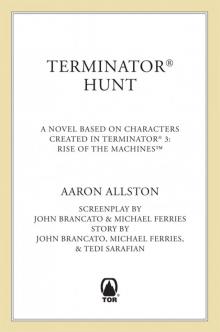 Terminator 3--Terminator Hunt
Terminator 3--Terminator Hunt Mercy Kil
Mercy Kil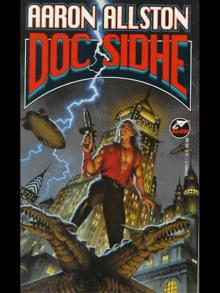 Doc Sidhe
Doc Sidhe Star Wars: Fate of the Jedi: Outcast
Star Wars: Fate of the Jedi: Outcast Fate of the Jedi: Backlash
Fate of the Jedi: Backlash Mercy Kill
Mercy Kill Rebel Stand
Rebel Stand Wraith Squadron
Wraith Squadron Star Wars: X-Wing VII: Solo Command
Star Wars: X-Wing VII: Solo Command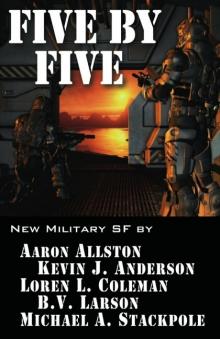 Five by Five
Five by Five Solo Command
Solo Command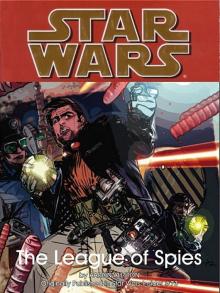 Star Wars: The Clone Wars Short Stories: The League of Spies
Star Wars: The Clone Wars Short Stories: The League of Spies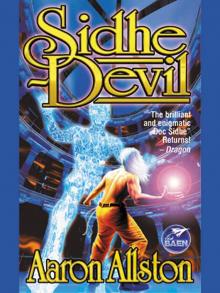 Sidhe-Devil
Sidhe-Devil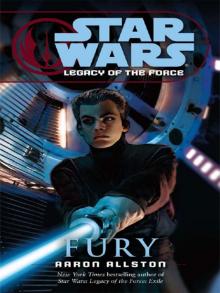 Star Wars: Legacy of the Force: Fury
Star Wars: Legacy of the Force: Fury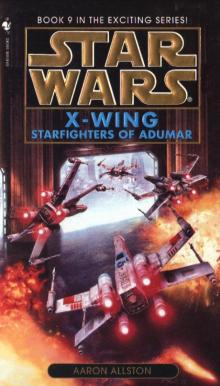 Starfighters of Adumar
Starfighters of Adumar Star Wars: X-Wing VI: Iron Fist
Star Wars: X-Wing VI: Iron Fist Star Wars - X-Wing - Iron Fist
Star Wars - X-Wing - Iron Fist Exile
Exile Star Wars: X-Wing V: Wraith Squadron
Star Wars: X-Wing V: Wraith Squadron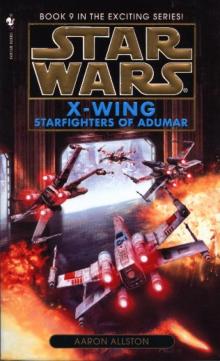 Star Wars - X-Wing - Starfighters of Adumar
Star Wars - X-Wing - Starfighters of Adumar Rebel Stand: Enemy Lines II
Rebel Stand: Enemy Lines II Rebel Dream: Enemy Lines I
Rebel Dream: Enemy Lines I Outcast
Outcast Star Wars - X-Wing 07 - Solo Command
Star Wars - X-Wing 07 - Solo Command